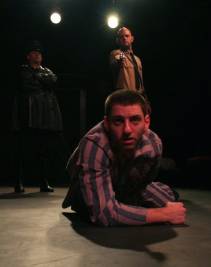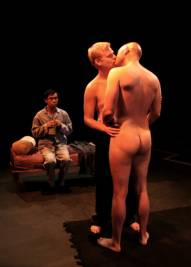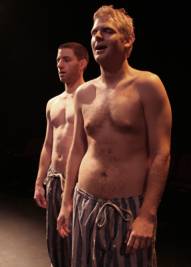RECOMMENDED
Recent years have seen great strides for the LGBT movement in the United States and even more so in certain other parts of the world. At the same time, as a visit to Towleroad.com will attest, anti-gay violence occurs on a daily basis, and in countries like Uganda, Iran, and Saudi Arabia, the mere fact of being gay can mean death, and not merely by your garden variety basher but by the government itself. Thus, Theatre Out’s production of Martin Sherman’s Bent comes at a propitious time indeed, and though a key directorial decision dilutes its power, a committed cast and one performance in particular make this an important piece of theater for LGBT playgoers and general audiences as well.
One can’t help wondering how Londoners must have reacted to Bent’s world premiere production thirty years ago, or Broadway audiences later that year. It was, after all, only a decade post-Stonewall, and any idea of gay marriage or of gays serving openly in the military was pretty much unimaginable back then. The AIDS virus was lurking in the blood of the earliest of its victims, but a plague that would decimate the gay community was equally inconceivable. Little had been written at that time about the persecution and mass murder of gays in Nazi Germany. In fact, few plays had even dealt with gay themes in a non-judgmental manner, let alone presented an image of two men whose love was more powerful than the forces of evil and hatred around them. Revolutionary indeed was Martin Sherman’s Bent, and even thirty years later, it has lost none of its power to shock, terrify, and move audiences to tears.
The play begins innocently enough. Max, a young man with a bitch of a hangover is brought morning coffee by his boyfriend Rudy, even though it’s already three in the afternoon. Rudy begins complaining about his dying plants, his tiresome job, and about the fact that the rent is three weeks overdue. Nothing too out of the ordinary in that. A naked blond man enters bleary-eyed, then stumbles into the bathroom, and again, nothing remarkable, either in the young man’s presence in Max and Rudy’s apartment or in the occurrence of full-frontal nudity in a gay-themed play. Max and Rudy go on to discuss last night’s three-way (Max and Wolf had gotten rough with each other and Rudy felt ignored) and the two lovers try to come up with ways they might find to pay their overdue rent. Max attempts to get rid of Wolf and also to correct any notion the shaved-headed young hunk may have gotten that Max is rolling in dough. In the meantime, someone’s knocking on Max and Rudy’s door, most likely the landlord wanting his rent, right
Wrong. The Gestapo have come to call, a pair of gun-toting officers with an order for Wolf’s arrest. When the young man attempts to escape, he is shot and then his throat is slit. Max and Rudy manage to make their escape, but they will not remain free for long, and only one will survive the train ride to Dachau.
Playwright Sherman has much more on its mind than simply telling another Holocaust story, albeit one that was little known in 1979. Bent is the account of one man’s journey towards self-worth, towards love, and towards salvation, though at a higher cost than he could ever have imagined. Be forewarned. There are no happy endings here. In fact, the first time I saw Bent on stage several years ago, I couldn’t get out of my seat for perhaps five minutes after its final fadeout. The current production at Theatre Out left me shaken as well.
Performing Bent is no easy task for its actors, as Sherman’s dialog can waver somewhere between poetic and artificial, as in a scene between Max, fellow prisoner Horst, and a concentration camp guard. At other times, the script comes across as if originally written in German, with that vaguely stilted quality that translations seem often to have. Despite these acting challenges, the cast acquit themselves more than admirably under MaryAnne Mosher’s mostly effective direction.
There is, however, one directorial misstep—Mosher’s decision to stage Bent semi-in-the-round. Mosher has reconfigured Theatre Out’s quite wide stage to position two rows of chairs on either side. Thus, wherever you sit, you have two rows of faces following the action from the other side, at best a distraction, and at worst, a serious impediment to full appreciation of two of the play’s most powerful scenes. Mosher’s decision to stage Bent with a minimal set and to surround the actors with black walls is a good one. If only all we saw were the actors, and the blackness behind them.
Performances range from good to outstanding. Though physically not the most ideal fit for the role of Max, or at least not as Horst describes him, Gregory Spradlin is very good indeed at showing us the character’s many contradictions—a gay man unable to feel, or at least show, love; a man who has lived his life openly but chooses to pass for Jewish in order not to be forced to wear the pink triangle, which he has been told will mark him as the lowest of the low in the camp’s pecking order; a man slowly awakening to his power of love while prevented by circumstances from being able to physically demonstrate this love, and prevented by barriers he himself has set up from admitting his true feelings.
David Tran does sweet, heartfelt work as Rudy, exhibiting a nice blend of delicacy and inner pluck. Travis McHenry plays one-night-stand Horst with just the right combination of sexiness and danger, and his willingness to appear nude considerably longer than this character normally does is sure to be appreciated by Theatre Out audiences. McHenry also doubles to scary effect as a concentration camp guard. Casting Stan Jenson, an over-50 actor, as club owner/drag performer Greta is an unexpected choice, but one that works, Jenson giving us a man grown jaded by life’s compromises who has learned how to stay afloat despite the storm raging around him. Andrew Kelley creates two such distinctive characters (Max’s gay married uncle Freddie and a monstrous Nazi captain) that it wasn’t until checking the cast list for this review that I realized the same actor was playing both roles. Ian Dunn and Joey Baital complete the supporting cast as a guard and prisoner.
Finally, there is the phenomenal Ben Green as Horst, giving by far the evening’s finest performance and elevating the production to excellence whenever onstage. It helps that Horst has some of the play’s most powerful scenes, including the two described below, but Green plays them (and others) with such gut-wrenching commitment and such absolute reality that it seems incredible that this is merely a performance and not real pain and suffering being experienced.
If only the decision to stage Bent with a split-in-half audience didn’t diminish the impact of two key scenes, despite the committed work of Green and Spradlin. In the first, concentration camp prisoners Max and Horst make love without ever touching, or even looking at each other (any physical or eye contact being punishable by death). A similar, less sexual though no less emotional scene, takes place several months later in the play’s chronology. When staged for maximum effectiveness, with both actors facing the audience, these two scenes are theater at its most compelling. At Theatre Out, Mosher has one actor facing half the audience and the second facing the opposite wall, meaning that half the audience sees only the back of his head throughout the scene. In the first scene, though I was able to experience Spradlin’s full performance, I was grievously deprived of Green’s facial expressions. In the second scene, in which I could hear and see all of Green’s brilliant work, the unfortunate other half of the audience got only half of it.
Christina L. Munich’s outstanding lighting is the production’s finest design element, suggesting a forest, a cramped train boxcar, and various seasons and temperatures in Dachau. David C. Carnevale’s costumes are well chosen for the time and place of the action. Set design by Mosher and Fred Mosher is exactly the stark darkness the play requires, marred only by those intrusive rows of spectators on opposite sides. Spradlin gets extra marks for his realistic fight choreography as does Jenson for the melody of Greta’s “Streets Of Berlin.”
Ultimately, despite its flaws, there are many good reasons to see Theatre Out’s production of Bent, a play as relevant in 2010 as when it first premiered. Whether or not you have seen Bent before, prepared to be shocked, shaken, and moved.
Theatre Out, The Empire Theatre, 202 N. Broadway, Santa Ana.
www.theatreout.com
–Steven Stanley
April 18, 2010
Photos Darcy Hogan





 Since 2007, Steven Stanley's StageSceneLA.com has spotlighted the best in Southern California theater via reviews, interviews, and its annual StageSceneLA Scenies.
Since 2007, Steven Stanley's StageSceneLA.com has spotlighted the best in Southern California theater via reviews, interviews, and its annual StageSceneLA Scenies.







 COPYRIGHT 2024 STEVEN STANLEY :: DESIGN BY
COPYRIGHT 2024 STEVEN STANLEY :: DESIGN BY